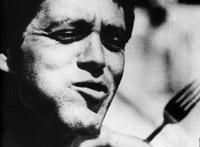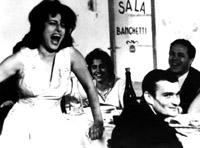Until last night, the only film directed by Pier Paolo Pasolini that I had ever seen was The Gospel According to St. Matthew (1964), though I had also seen Federico Fellini’s Nights of Cabiria (1957; my comments), to which Pasolini contributed some dialogue. Obviously, since I have made a point of seeing the non-Jesus films made by other directors who have made Jesus films, my lack of exposure to Pasolini’s other work is a problem.
So, last night, as part of the Pacific Cinematheque‘s Pier Paolo Pasolini retrospective, I caught the first two films he directed — Accattone (1961) and Mamma Roma (1962) — and I was pleasantly surprised to see that I really liked them. Like Cabiria, these films concern pimps and prostitutes trying to reform their lives, and there is a definite sympathy for the characters and a lyricism to the films that makes them quite engaging.
 Accattone stars Franco Citti — a Pasolini regular, he was also in two Godfather films as Al Pacino’s Sicilian bodyguard — as a pimp who has never worked a day in his life and who compels his main squeeze to keep working the streets even after her broken leg is put in a cast. When one of her tricks goes bad, and she is sent to prison for perjury, Citti falls in love with another woman and tries to change his ways, with mixed results.
Accattone stars Franco Citti — a Pasolini regular, he was also in two Godfather films as Al Pacino’s Sicilian bodyguard — as a pimp who has never worked a day in his life and who compels his main squeeze to keep working the streets even after her broken leg is put in a cast. When one of her tricks goes bad, and she is sent to prison for perjury, Citti falls in love with another woman and tries to change his ways, with mixed results.
Pasolini has been called a “neorealist”, which evokes comparisons to such countrymen of his as Roberto Rossellini and Vittorio De Sica, but his poetic sensibility points beyond the movement’s straightforward depiction of lower-class life to something a little more ethereal; among other things, the film closes with a dream sequence, which raises the interesting question of whether a dream can ever be portrayed in a “realist” fashion.
On a parallel note, Pasolini himself once admitted to an interviewer that, while he based his Jesus film on Matthew’s gospel because Matthew was more concerned than the others with the affairs of day-to-day life, he actually preferred the mysticism of John’s gospel; and that same mix of impulses, that rootedness in reality while looking for something higher, is evident in this film as well, particularly in scenes where he plays the music of Bach over images of people being beaten, etc.; his use of such music is ironic, but not sarcastic, if you know what I mean. In fact, I believe the Bach tune that begins Accattone is the exact same one he went on to use over the opening credits of Matthew, which casts the aesthetics of that film in a whole new light, for me.
 Mamma Roma, meanwhile, is a dynamic tour-de-force for Anna Magnani, who plays a prostitute full of life, humour, pathos and boundless energy; she laughs so often, and so hard, that you get a better look at her tonsils without the aid of close-ups than you’ll ever see of anyone else’s. In the first scene, she brings three pigs to the wedding reception of her former pimp (Citti again), and the animals loiter between the tables as the reception progresses, eating the scraps that fall to the floor; this inevitably brought to mind a certain biblical passage. Then Mamma Roma, the groom and the bride begin mocking each other through a series of improvised songs. It’s all quite funny, really.
Mamma Roma, meanwhile, is a dynamic tour-de-force for Anna Magnani, who plays a prostitute full of life, humour, pathos and boundless energy; she laughs so often, and so hard, that you get a better look at her tonsils without the aid of close-ups than you’ll ever see of anyone else’s. In the first scene, she brings three pigs to the wedding reception of her former pimp (Citti again), and the animals loiter between the tables as the reception progresses, eating the scraps that fall to the floor; this inevitably brought to mind a certain biblical passage. Then Mamma Roma, the groom and the bride begin mocking each other through a series of improvised songs. It’s all quite funny, really.
From there, the film concerns Mamma Roma’s efforts to get a real job and to renew her relationship with her 18-year-old son (Ettore Garofolo), who is interested in one of the local girls; in one scene, he offers this young woman a necklace of the Madonna and watches it rest in her cleavage as she puts it on. Mamma thinks her son could do better than this woman, though; meanwhile, her ex-pimp comes back into her life and makes a few demands that get in the way of her own plans. I’m not entirely sure what I make of the film’s climax, yet, but I love the way Pasolini and cinematographer Tonino Delli Colli capture life on the outskirts of Rome — full of empty roads, tall grass, developing buildings and desolate ruins — and I wouldn’t mind seeing it again.












